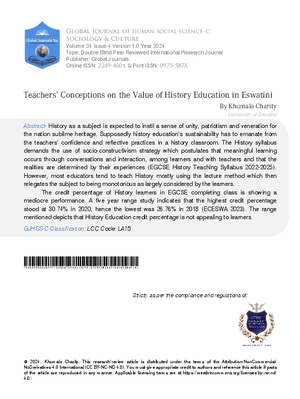Teachers’ Conceptions on the value of History Education in Eswatini.
Keywords:
Abstract
History as a subject is expected to instil a sense of unity patriotism and veneration for the nation sublime heritage Supposedly history education s sustainability has to emanate from the teachers confidence and reflective practices in a history classroom The History syllabus demands the use of socio-constructivism strategy which postulates that meaningful learning occurs through conversations and interaction among learners and with teachers and that the realities are determined by their experiences EGCSE History Teaching Syllabus 2022-2025 However most educators tend to teach History mostly using the lecture method which then relegates the subject to being monotonous as largely considered by the learners The credit percentage of History learners in EGCSE completing class is showing a mediocre performance A five year range study indicates that the highest credit percentage stood at 30 74 in 2020 hence the lowest was 26 76 in 2018 ECESWA 2023 The range mentioned depicts that History Education credit percentage is not appealing to learners Successful implementation of History Education curricula depends on teachers ownership attitudes and knowledge about the curriculum because they are the closest individuals to circumstances of the decision made and their role as educators gives them significant influence on successful curriculum implementation Sengai and Mokhele 2021
Downloads
How to Cite
References

Published
1970-01-01
Issue
Section
License
Copyright (c) 2024 Authors and Global Journals Private Limited

This work is licensed under a Creative Commons Attribution 4.0 International License.